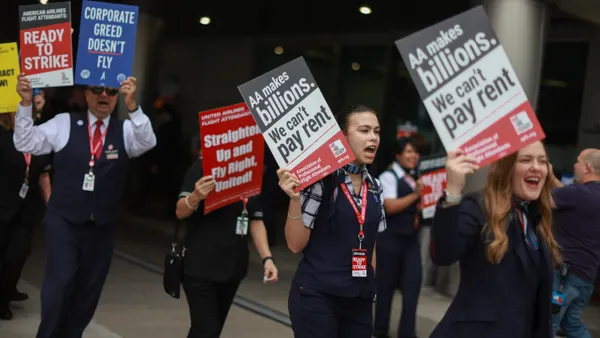Dive Brief:
- Sixty percent of workers in a Bospar study said they don't have a preference in their choice of co-workers when it comes to sexual orientation and gender expression, up from 55% last year, the company said in a press release emailed to HR Dive. The tech PR firm said it polled 2,000 U.S. adults for the 50th anniversary of Pride.
- The poll also showed that 83% of respondents believe LGBTQ employees will achieve equality in the workplace thanks to greater diversity in the workforce, more education about LGBTQ issues, younger professionals entering the workforce and more workers coming out as LGBTQ.
- While 68% of respondents said they think equality for LGBTQ people is improving, challenges persist, according to Bospar. Almost a third of respondents said they've been harassed at work because of their sexuality and 29% agree with Alabama Public Television's decision to ban the airing of an episode of "Arthur," the children's cartoon program, because it featured a gay wedding.
Dive Insight:
As American attitudes toward LGBTQ people continue to improve, employers have largely responded in kind. In recent years, employers have expanded their benefits to cover same-sex partners and have introduced benefits to address the medical needs of some people in trans community. Still, bias remains, forcing some LGBTQ workers to remain closeted at work to avoid being targeted for discrimination. In a Boston Consulting Group survey from 2018, 80% of employees said they were ready to disclose their orientation, but only half actually had.
The U.S. Supreme Court announced in April that it will decide whether LGBTQ workers are protected under Title VII of the Civil Rights Act of 1964. The High Court will hear three cases: Bostock v. Clayton County, Georgia; Altitude Express, Inc., et al. v. Zarda, Melissa, et al. and R.G. & G.R. Harris Funeral Homes v. EEOC, et al in order to resolve a lower court split on the matter.
But employers don't have to wait for the High Court's decision; they can extend current anti-discrimination policies to include LGBTQ workers or draft new policies that protect the rights of all workers. Education, particularly of managers, is key — but ensuring communication lines are open and that LGBTQ employees can speak to their managers about their needs is paramount, experts have said.












